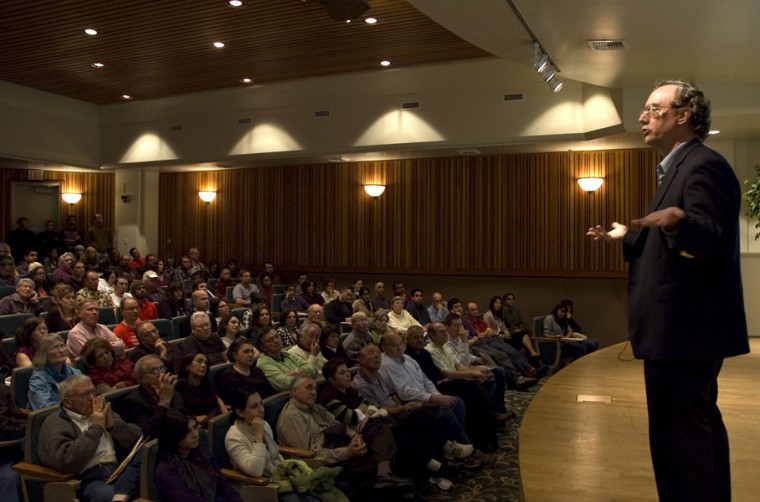Diplomacy with Iran a challenge for Obama
Professor Juan Cole discusses relations between the Obama administration and Iran in a packed Hinde Auditorium Friday night.:
November 21, 2009
President Barack Obama’s administration has made “significant strides” to loosed tensions with Iran that were created by the Bush administration. However, it’s become more difficult for the administration to make peace with Iran, said Middle Eastern studies expert Juan Cole.
More than 100 students, faculty members and alumni attended Cole’s lecture titled “Can the Obama Administration Avoid War with Iran?” on Friday.
“It looks to me as though the Obama administration is trying to avoid conflict with Iran because it needs Iran on other grounds, but I would say we’re not out of the woods yet,” Cole said.
Cole has written a book titled “Engaging the Muslim World,” and has traveled the Middle East for three decades and has written about Iran, Iraq, Eqypt and South Asia.
Cole said the Obama administration is facing the challenge of trying to make peace with Iran while the same time, dealing with a regime that has angered much of the Iranian people.
“So Obama’s two big projects of concluding these wars that the previous administration started and getting out cleanly depend deeply and profoundly on the goodwill of Ayatollah Ali Khamenei and President Mahmoud Ahmadinejad,” Cole said. “That’s one of the reasons that Obama is so eager to get off the war footing that Bush had put us on with Iran and to make a deal with Iran.”
However, negotiations with Iran, which was one of Obama’s campaign promises, have become more difficult to achieve because the Iranian regime now looks “completely illegitimate,” Cole said.
“The prospects of direct negotiations were interrupted because the Iranian leadership decided to steal the election in June, which rather angered much of the Iranian populace,” Cole said. “It put Obama in a very difficult position, and he doesn’t succeed in his foreign policy goals unless he has good relations with this regime.”
Cole also shared his view that Iran has no nuclear weapons program and is not aspiring for one, which counteracts much of what’s been said in Washington and reported in the media.
Cole said the evidence based on assessments by United States intelligence agencies point out that Iran has no nuclear weapons program and hasn’t done nuclear weapons-related research since early 2003 when the Saddam Hussein regime in Iraq was overthrown. He said that what Iran is trying to achieve instead is “nuclear latency” or the “Japan option.”
“Latency is the possession of a nuclear energy program and of reactors, which would allow the production of an atomic bomb on short notice if an extreme danger to national autonomy reared its ugly head,” Cole said in his daily blog, Informed Comment.
Cole said he thinks that although western leaders are aware that Iran is only trying to achieve “nuclear latency” and not nuclear weapons, they still emphasize the latter because it’s a better sell to the public.
International affairs graduate student Louis Cathemer said this point of view is the “most important thing” he learned from the lecture.
“It’s an analysis that maybe doesn’t coincide exactly with the conventional wisdom, what we hear out of Washington,” Cathemer said. “This is I think a broader and fuller understanding of the issues and not focused on the sound bytes and war mongering that everybody focuses on.”
Senior international relations major Assad Hafeez said the lecture clarifies misconceptions common in coverage of international issues.
“He brought a lot of insight on how some of the beliefs of threats being exchanged are really extrapolated from misinterpretations,” Hafeez said.
































































































































